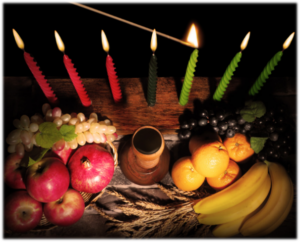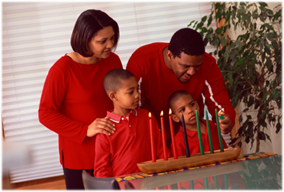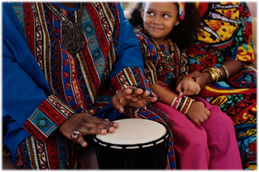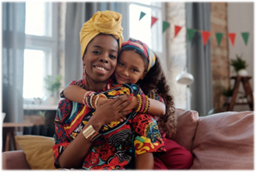Kwanzaa, celebrated each year from December 26 to January 1, stands as a vibrant acknowledgment of African heritage. Rooted in the principles of community, culture, and reflection, this rich tradition invites families to gather, share stories, and celebrate their collective identity. Each day highlights a specific principle that fosters unity, growth, and cultural pride within communities. As the candle flames dance brightly, they illuminate not only shared traditions but also the beautiful diversity that exists within every family.
Embracing neurodiversity is essential in these cultural practices. Celebrating Kwanzaa offers a wonderful opportunity to engage every member of the family, including neurodiverse children who experience the world uniquely. Their involvement enriches Kwanzaa’s spirit of inclusivity and by integrating tailored approaches into traditional rituals we ensure that every voice rings out harmoniously.
Adapting traditions
As my family gathers to honor cultural heritage and community values through this celebration, it becomes essential to ensure that my son feels included in both spirit and practice. For us, this means adapting traditional activities, so they resonate with everyone while still honoring the essence and core values of Kwanzaa.
My son is autistic, and he thrives in familiar settings but struggles with sensory overload. To adapt our Kwanzaa festivities, we created cozy spaces filled with calming lights and quiet corners where he can retreat if needed during larger family gatherings. This allows us to maintain the celebratory atmosphere without compromising his comfort.
Creating sensory-friendly spaces is a key strategy for successful celebrations. Consider designating a retreat area where children can find peace if festivities become overwhelming. Use calming colors, soft lighting, and soothing sounds to ensure this space feels safe and inviting. During larger gatherings, such as feasts or storytelling sessions, parents might include noise-canceling headphones or fidget tools to help manage anxiety levels in neurodiverse children. Such adaptations convey understanding and respect toward individual needs while still celebrating together as a unified family.
Consider integrating activities that ignite your neurodiverse child’s interests and align with their sensory preferences. For example, families can craft vibrant decorations that reflect both Kwanzaa’s principles and family heritage, allowing children to express creativity in a tactile way. Engaging them in art projects not only fosters connection to tradition but also provides a fun outlet for self-expression. This involvement can enhance their enthusiasm about Kwanzaa while encouraging pride in their heritage.
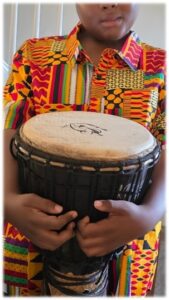
My son Kevin holding our Djembe drum.
Another way we include my son is by celebrating with tactile activities—like crafting handmade decorations or preparing traditional dishes—that appeal to different senses. My son loves to use the vegetable peeler and other kitchen tools, so I let him help me prep for the dishes I plan to cook for our dinner. He also loves to tear paper so an activity we will try this year is taking pieces of paper he has torn and making paper from those pieces. We are really excited about that.
We have an African drum called Djembe and several other instruments my son really enjoys so we have incorporated rhythmic drumming sounds around the candles’ lighting. This alteration turns the event into an engaging multisensory experience that captivates everyone while fostering a deeper sense of connection for us all.
Involving children in planning activities can be helpful in ensuring everyone feels included during Kwanzaa festivities. Encourage conversations about which traditions they enjoy most or how they envision holiday rituals taking shape this year. Let them choose stories to read under the kinara or select recipes for traditional dishes they’d like to prepare together. By incorporating personal preferences into planning, families strengthen bonds and foster a sense of ownership over Kwanzaa traditions—ultimately creating memorable experiences tailored specifically for each family member’s unique perspective.
Kwanzaa in community
Celebrating Kwanzaa extends beyond the home; it thrives in community engagement. Local organizations often host events that promote diversity and inclusion, making it a wonderful time for families to connect and learn from one another. For instance, community centers may organize cultural fairs featuring traditional music, dance performances, and art exhibits that celebrate African heritage. These gatherings not only showcase the richness of Kwanzaa’s history but also foster an atmosphere of love and acceptance among attendees, including neurodiverse children who can appreciate the sensory experiences these events offer.
Networking with other families is equally important. Parents can share personal insights about adapting traditions in ways that honor each child’s unique perspective as they navigate this celebration together. This interaction creates a support system rooted in empathy and shared experiences. Connecting with nearby groups focusing on inclusivity ensures parents feel less isolated in their journeys—and reinforces the idea that love and acceptance are core tenets not just during Kwanzaa but throughout every day.
Kwanzaa in everyday life
The spirit of Kwanzaa doesn’t have to end when the holiday does. Families can carry forward the lessons learned from this celebration into their daily lives, fostering environments where both cultural heritage and individual differences thrive year-round. Engaging in ongoing storytelling within families serves as a powerful tool for sharing experiences, building understanding, and promoting inclusivity. By discussing traditions and values inspired by Kwanzaa regularly, families model acceptance and respect for neurodiversity while preserving their cultural identity.
Creating inclusive spaces continues beyond the festive period as well. Regularly assess your home’s sensory environment with your child’s needs in mind. Set up cozy reading corners filled with books featuring diverse characters or showcase artwork that reflects varied cultural backgrounds. When every member feels acknowledged through daily practices that honor individuality, you build a stronger foundation for minds to thrive—a vital component for neurodiverse families.
I encourage you to explore the Kwanzaa traditions and ways to merge them with the diverse needs of neurodiverse individuals. Incorporating inclusive celebrations within Kwanzaa, whether at home or in the community, not only honors culture but highlights the beauty of diversity in how individuals interact with tradition. Each adaptation provides layers of meaning that enhance personal connections, ensuring that everyone shares joy during this important time of year.
To learn more about the origins, core principles, and practices of Kwanzaa, follow this link.
Tags: adapting celebrations, Kwanzaa Go back

